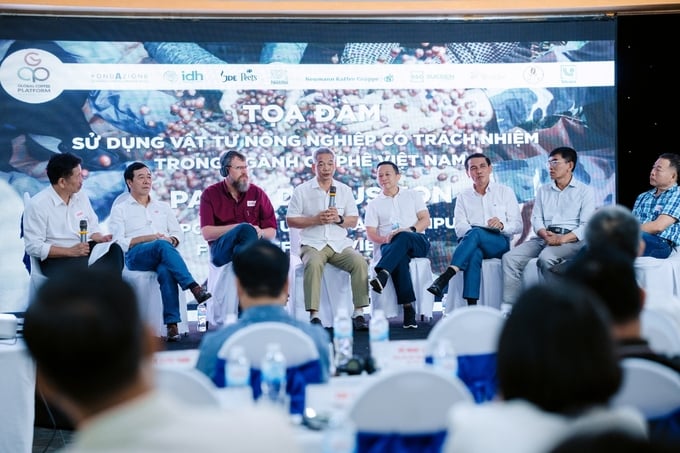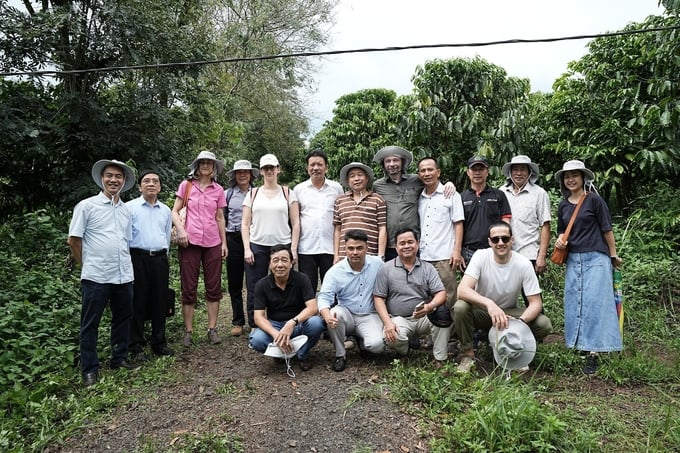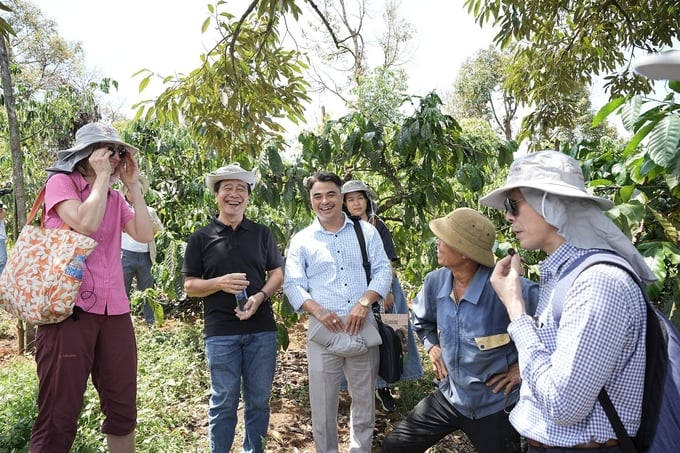November 26, 2025 | 23:44 GMT +7
November 26, 2025 | 23:44 GMT +7
Hotline: 0913.378.918
November 26, 2025 | 23:44 GMT +7
Hotline: 0913.378.918

Multi-stakeholder panel discussion on responsible use of agro-inputs in coffee production in Vietnam, held in Dak Nong province. Photo: GCP.
The Global Coffee Platform (GCP), a multi-stakeholder membership association that promotes the coffee industry's long-term development, is currently implementing several programs and activities to promote sustainable coffee production in Vietnam, including the Collective Action Initiative on "Responsible Use of Agro-Inputs for Coffee in Vietnam" (CAI).
The primary goal of this Initiative is to provide recommendations and instructions to farmers on how to use agro-chemicals responsibly and ecology-friendly, thereby contributing to the sustainable development of the Vietnam's coffee sector.

The GCP recently hosted a multistakeholder panel discussion on "Responsible Use of Agro-inputs for Coffee Production in Vietnam" with representatives from relevant agencies at the central and provincial levels, as well as relevant actors in the coffee industry (roasters, traders, input suppliers, international organizations and GCP members, farmers, etc.).
The event aims to share the results and lessons of the Initiative, which has been implemented in the Central Highlands over the past four years. The Initiative’s activities focused on promoting sustainable coffee production practices through improved weed management and responsible use of agro-inputs that meet importing coutries’ regulatory requirements, boosting farmer income and protecting the environment. In addition, the Initiative aims to raise farmers' awareness of weed management in coffee production and limit the use of pesticides, with an emphasis on glyphosate-containing herbicides; and raise public awareness regarding the importance of responsible agricultural waste collection and management.

The panel discussion also provided an opportunity for key departments and actors in the coffee production and supply chain to exchange opinions and deliberate on current issues and challenges in strategic planning and management of coffee production. Subsequently, stakeholders can identify long-term solutions to ensure sustainable coffee production, economically, socially, and environmentally. Additionally, particular attention was dedicated to meeting the hygiene and food safety requirements of major and traditional markets, notably those governed by strict and demanding standards such as the EU.
The panel discussion further explored the values and effects of collective action and pre-competitive approach advocated by GCP within the coffee industry. Accordingly, GCP aims to optimize scarce resources while mitigating risks.
Translated by Nguyen Hai Long
/2025/11/26/4909-2-154329_878.jpg)
(VAN) Pearl grouper farming in HDPE cages not only delivers economic efficiency but also contributes to protecting the environment, creating jobs, and promoting marine-based experiential tourism.

(VAN) The model of making a living under the forest canopy through the agroforestry system in Van Son commune, Bac Ninh province, is expected to generate an annual income of approximately VND 30 million/ha.

(VAN) Many enterprises in Can Tho are harnessing natural energy and reducing greenhouse gas emissions in their production processes, thereby contributing to the promotion of a sustainable green transition.
/2025/11/24/3536-2-112800_176.jpg)
(VAN) Dong Nai now has tens of thousands of hectares of forests certified for sustainable management, and this area will continue to be expanded in the coming period.

(VAN) Vinh Ha hamlet (Dai Xuyen commune, Hanoi) is shifting away from small-scale farming as households adopt bioscurity into their breeder chicken models.

(VAN) Heavy rains make aquatic species more vulnerable to disease. Proactive water management and high-tech systems help farmers prevent outbreaks and protect yields.

(VAN) Greenhouses are shifting production mindsets in Binh Lu commune, enabling farmers to ‘weather the sun and rain’ and secure stable vegetable harvests throughout the year.